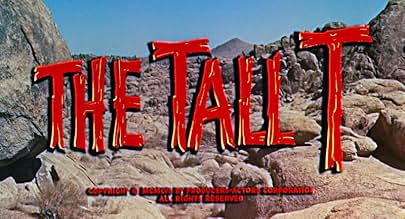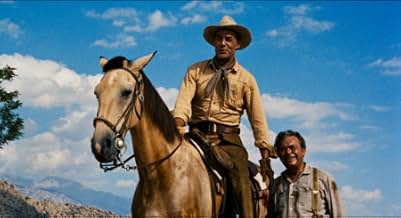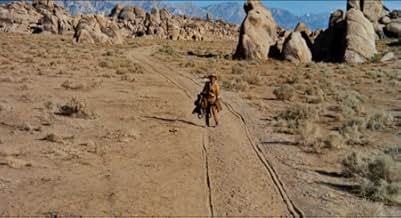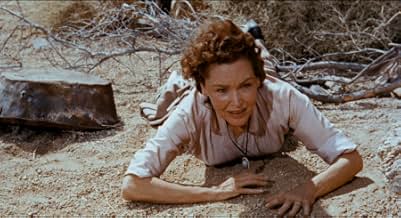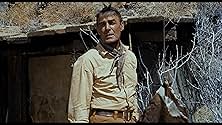CALIFICACIÓN DE IMDb
7.3/10
6.8 k
TU CALIFICACIÓN
Tres forajidos sin escrúpulos secuestran a un ranchero y a una heredera para pedir un rescate.Tres forajidos sin escrúpulos secuestran a un ranchero y a una heredera para pedir un rescate.Tres forajidos sin escrúpulos secuestran a un ranchero y a una heredera para pedir un rescate.
- Dirección
- Guionistas
- Elenco
- Premios
- 1 premio ganado en total
Robert Anderson
- Jace
- (sin créditos)
Dick Johnstone
- Townsman
- (sin créditos)
Anne Kunde
- Townswoman
- (sin créditos)
Christopher Olsen
- Jeff
- (sin créditos)
Fred Sherman
- Hank Parker
- (sin créditos)
- Dirección
- Guionistas
- Todo el elenco y el equipo
- Producción, taquilla y más en IMDbPro
Opiniones destacadas
This is an example of a western made with not much money and very much punch. Boetticher delivers again and this is one of his best, with But Kennedy on hand to craft an excellent script.
Critics wax eloquent about Anthony Mann's use of scenery (as if he had nothing to say or do beyond that) but never mention Boetticher's use of the physical world and its geometry, but there is definitely something to speak of them in this film. The rocks and the rocks behind the rocks are beautifully used here and their iconography (an unadorned rock-solid shoot-out) work wonderfully well.
Scott is occasionally sappy during the beginning, admitted, but confronted with unspeakable crimes, never explicit or explained in full, are avenged with cool efficiency and nothing sentimental whatsoever from then on. The O'Hara-Scott relation is absolutely fascinating. This is a western for people who take westerns straight.
Curtis Stotlar
Critics wax eloquent about Anthony Mann's use of scenery (as if he had nothing to say or do beyond that) but never mention Boetticher's use of the physical world and its geometry, but there is definitely something to speak of them in this film. The rocks and the rocks behind the rocks are beautifully used here and their iconography (an unadorned rock-solid shoot-out) work wonderfully well.
Scott is occasionally sappy during the beginning, admitted, but confronted with unspeakable crimes, never explicit or explained in full, are avenged with cool efficiency and nothing sentimental whatsoever from then on. The O'Hara-Scott relation is absolutely fascinating. This is a western for people who take westerns straight.
Curtis Stotlar
8fs3
Boetticher and Scott spent the latter half of the 1950s making some terrific, adult, low-key Westerns, of which this stands as the best. Atmosphere, technical work and acting are all excellent, with interesting villain characterizations and a well-realized flawed hero in Scott.
Brutal and vivid, great-looking, and among Elmore Leonard's earliest writing work in the medium. Check out this classic, as well as the other films of the star and director (also the similar, excellent Gary Cooper/Anthony Mann teaming in the following year's Man of the West.)
Brutal and vivid, great-looking, and among Elmore Leonard's earliest writing work in the medium. Check out this classic, as well as the other films of the star and director (also the similar, excellent Gary Cooper/Anthony Mann teaming in the following year's Man of the West.)
SPOILERS.
If you're attracted only to black-and-white dramas shot in the rain in Slovenia, you probably won't like this one.
It's a no-nonsense El Cheapo Western shot on a low budget, an elementary piece of exposition of masculine honor, with Boetticher, Scott, Kennedy, Richard Boone, and movie flats -- all at the top of their forms.
What distinguishes the half-dozen or so Westerns that came from Boetticher and Scott is not so much the plot, which is generally simple, but the slight twists in character and the occasional grace notes in the dialogue.
You have to love this dialogue. "Cookin'? That's WIMMIN's work!" And, said by Scott in all sincerity, "There are some things a man can't ride around." And, "There are ten head of wimmin for every man in Sonora. Course, most of them is just hurrah gals." And, "I'm not gonna get shot in the belly just 'cause you're feelin' sorry for yourself." And, "Why don't you just say it out in words?"
Basically the story has Scott and O'Sullivan (who, twenty years earlier had been Tarzan's delectable mate) held hostage by Boone and his two shallow young companions, Billy Jack (Skip Homeier) and Chink (Henry Silva). Boone, although a vicious murderer, is not entirely unsympathetic. He feels forced to "run with" these coarse companeros who live from moment to moment. They don't even know their own ages. They've been beaten and mistreated since they were kids. ("You run with them," says Scott reprovingly.) Boone, on the other hand, is sick of their talk about wimmin and such. He is lonely, has no family or wummin waiting for him. "Talk," he orders Scott at gunpoint, "about anything!" He dreams of someday having a spread of his own, with a couple of cattle, working the ground.
But the code -- I mean the movie code of the 1950s, not the Western code -- is an unforgiving one. He is, after all, a murderer. When O'Sullivan's cowardly new husband is given permission to ride off to freedom and desert his wife, Boone turns away and mutters, "Bust him, Chink." The coward's name is Willard Mimms -- Arthur Honeycutt draws out the vowel and imposes a dipthong on it when he pronounces the name -- "Mee-yums." We know Mimms is toast five seconds after we meet him.
Richard Boone is great as the heavy with the daydreams. In a particularly violent climax he is blinded by a shotgun, twirls around entangled in a burlap sheet, and collapses. Scott shows his range in this movie. He laughs at the beginning and becomes grim after being taken hostage. He even forcefully smothers O'Sullivan in passionate kisses. And I thought he only like horses and mules. Commanding too is the performance of Henry Silva, in pink shirt and suspenders. He's clever, the way a sewer rat is clever. He slouches when he walks, and he stands hipshot. His expression hardly ever varies. And his voice is matter of fact, even when he's eagerly anticipating dumping yet another body in the well.
It's quite a lot of fun, shot as it is in Movie Flats. That's Mount Whitney in the background, the highest peak in California's Sierra Nevada. The highest peak in the lower 48 for that matter.
If you're attracted only to black-and-white dramas shot in the rain in Slovenia, you probably won't like this one.
It's a no-nonsense El Cheapo Western shot on a low budget, an elementary piece of exposition of masculine honor, with Boetticher, Scott, Kennedy, Richard Boone, and movie flats -- all at the top of their forms.
What distinguishes the half-dozen or so Westerns that came from Boetticher and Scott is not so much the plot, which is generally simple, but the slight twists in character and the occasional grace notes in the dialogue.
You have to love this dialogue. "Cookin'? That's WIMMIN's work!" And, said by Scott in all sincerity, "There are some things a man can't ride around." And, "There are ten head of wimmin for every man in Sonora. Course, most of them is just hurrah gals." And, "I'm not gonna get shot in the belly just 'cause you're feelin' sorry for yourself." And, "Why don't you just say it out in words?"
Basically the story has Scott and O'Sullivan (who, twenty years earlier had been Tarzan's delectable mate) held hostage by Boone and his two shallow young companions, Billy Jack (Skip Homeier) and Chink (Henry Silva). Boone, although a vicious murderer, is not entirely unsympathetic. He feels forced to "run with" these coarse companeros who live from moment to moment. They don't even know their own ages. They've been beaten and mistreated since they were kids. ("You run with them," says Scott reprovingly.) Boone, on the other hand, is sick of their talk about wimmin and such. He is lonely, has no family or wummin waiting for him. "Talk," he orders Scott at gunpoint, "about anything!" He dreams of someday having a spread of his own, with a couple of cattle, working the ground.
But the code -- I mean the movie code of the 1950s, not the Western code -- is an unforgiving one. He is, after all, a murderer. When O'Sullivan's cowardly new husband is given permission to ride off to freedom and desert his wife, Boone turns away and mutters, "Bust him, Chink." The coward's name is Willard Mimms -- Arthur Honeycutt draws out the vowel and imposes a dipthong on it when he pronounces the name -- "Mee-yums." We know Mimms is toast five seconds after we meet him.
Richard Boone is great as the heavy with the daydreams. In a particularly violent climax he is blinded by a shotgun, twirls around entangled in a burlap sheet, and collapses. Scott shows his range in this movie. He laughs at the beginning and becomes grim after being taken hostage. He even forcefully smothers O'Sullivan in passionate kisses. And I thought he only like horses and mules. Commanding too is the performance of Henry Silva, in pink shirt and suspenders. He's clever, the way a sewer rat is clever. He slouches when he walks, and he stands hipshot. His expression hardly ever varies. And his voice is matter of fact, even when he's eagerly anticipating dumping yet another body in the well.
It's quite a lot of fun, shot as it is in Movie Flats. That's Mount Whitney in the background, the highest peak in California's Sierra Nevada. The highest peak in the lower 48 for that matter.
Borrowing elements from Stagecoach and Rawhide, The Tall T is one lean and mean collaboration from director Budd Boetticher and star Randolph Scott. It's one of the best of the seven films the two men did together in the Fifties.
Scott's lost a horse on a bet with his old boss Robert Burton and is walking back to his place, a good 15 miles carrying saddle and other western gear. A stagecoach stops and driver Arthur Hunnicutt offers him a lift. It's not the regular stagecoach run, it's been hired by John Hubbard for him and his wife Maureen O'Sullivan. She's the only child of a millionaire mine owner and Hubbard was the bookkeeper for her father. It's made quite obvious from the beginning this is not a love match.
When the stagecoach gets to a way station, it's been taken over by outlaws Richard Boone, Skip Homeier, and Henry Silva. They think it's the regular coach run, but when they hear how O'Sullivan's father is worth millions, they decide on a kidnap.
The T in The Tall T might just stand for tension because that's what the film bristles with. Once Scott, O'Sullivan, and Hubbard are taken prisoner, the film's suspense doesn't let up for a minute. Scott is at his most forthright as a western hero in The Tall T.
Homeier and Silva play their usual punk roles to perfection. Boone is lean and mean as their leader, a worthy adversary for Scott. Of course it's the other two with their more than human weaknesses that leads to their downfall.
The Tall T is one of the best of Randolph Scott's westerns required viewing if one calls thyself a Randolph Scott fan.
Scott's lost a horse on a bet with his old boss Robert Burton and is walking back to his place, a good 15 miles carrying saddle and other western gear. A stagecoach stops and driver Arthur Hunnicutt offers him a lift. It's not the regular stagecoach run, it's been hired by John Hubbard for him and his wife Maureen O'Sullivan. She's the only child of a millionaire mine owner and Hubbard was the bookkeeper for her father. It's made quite obvious from the beginning this is not a love match.
When the stagecoach gets to a way station, it's been taken over by outlaws Richard Boone, Skip Homeier, and Henry Silva. They think it's the regular coach run, but when they hear how O'Sullivan's father is worth millions, they decide on a kidnap.
The T in The Tall T might just stand for tension because that's what the film bristles with. Once Scott, O'Sullivan, and Hubbard are taken prisoner, the film's suspense doesn't let up for a minute. Scott is at his most forthright as a western hero in The Tall T.
Homeier and Silva play their usual punk roles to perfection. Boone is lean and mean as their leader, a worthy adversary for Scott. Of course it's the other two with their more than human weaknesses that leads to their downfall.
The Tall T is one of the best of Randolph Scott's westerns required viewing if one calls thyself a Randolph Scott fan.
10lwetzel
**** I never really figured out what the Tall T exactly was. It doesn't matter. This is a great film and an outstanding western. The actors are all good, especially Randolph Scott as a western everyman (I always want to repeat the "Blazing Saddles" homage to Scott whenever I say his name)and Richard Boone as one of the most evil bad men in western film history. Skip Homeier and Henry Silva give great performances as two young guns who are teamed up with Boone. They are sexy and evil at once. The dialogue is biting, the situations are adult and dramatic, the scenery is superb, and the music complements the film's tension to a Tall T.
¿Sabías que…?
- TriviaAlthough playing the older man, Arthur Hunnicutt was in reality twelve years younger than Randolph Scott.
- ErroresAs Brennan rides into town, after the meeting with the station keeper and his son, he passes the stage, which is standing in the street. Behind the stage, in the street behind, there is a parked car.
- Citas
[last lines]
[Pat, to the weeping Doretta, after he has killed three murderous kidnappers]
Pat Brennan: Come on now. It's gonna be a nice day.
Selecciones populares
Inicia sesión para calificar y agrega a la lista de videos para obtener recomendaciones personalizadas
- How long is The Tall T?Con tecnología de Alexa
Detalles
- Fecha de lanzamiento
- País de origen
- Idioma
- También se conoce como
- The Captives
- Locaciones de filmación
- Productoras
- Ver más créditos de la compañía en IMDbPro
- Tiempo de ejecución
- 1h 18min(78 min)
Contribuir a esta página
Sugiere una edición o agrega el contenido que falta


